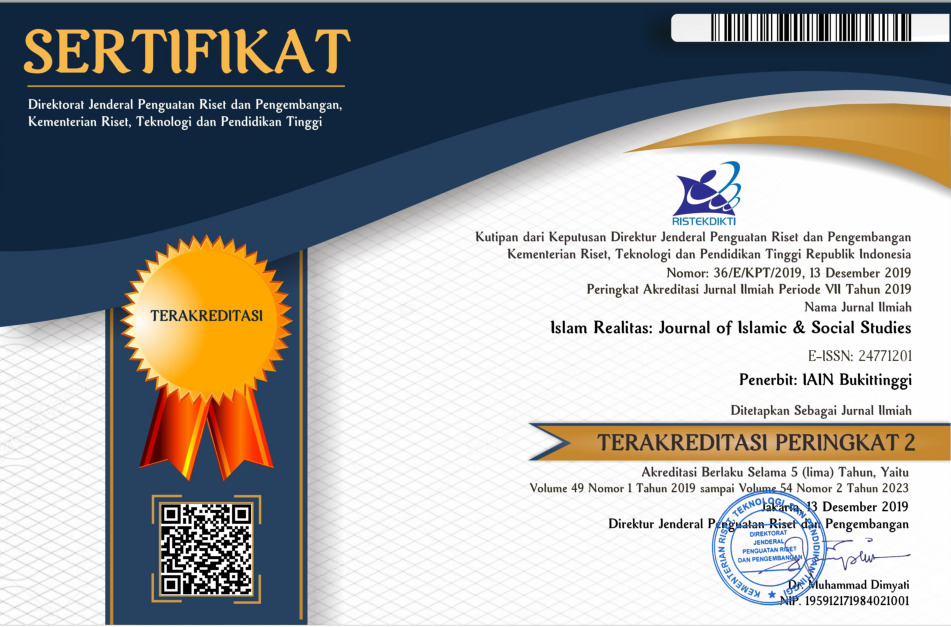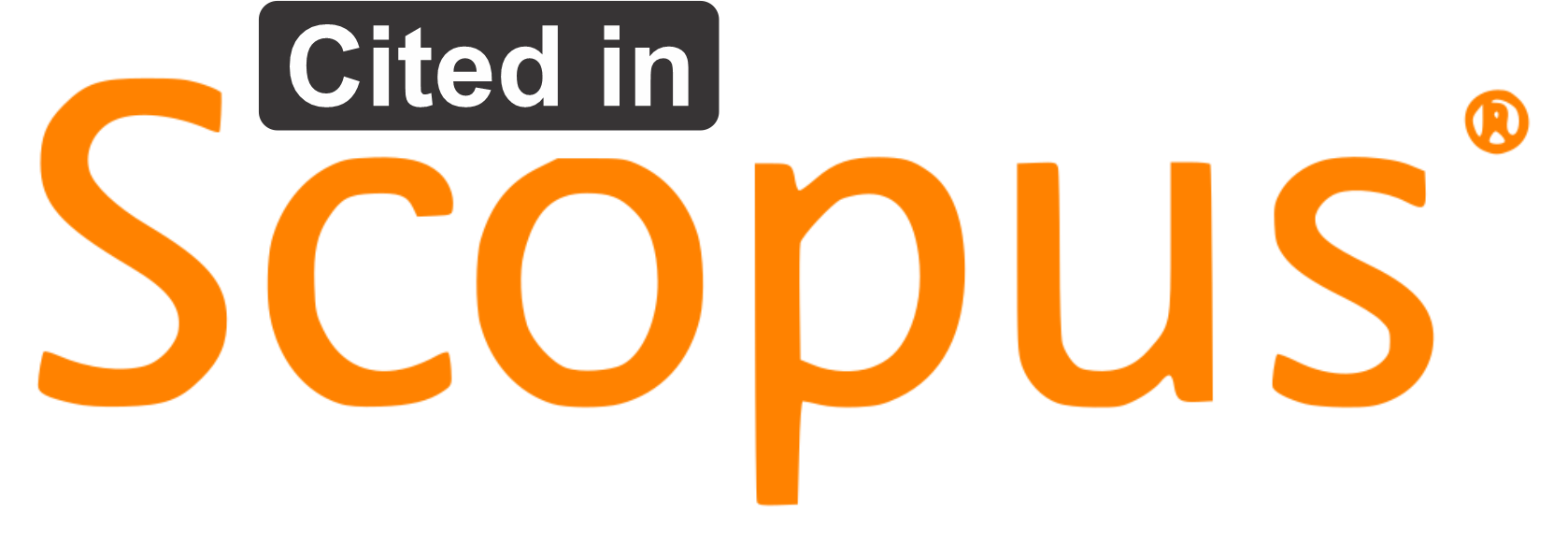ACHIEVING HARMONY THROUGH PROGRESSIVE ISLAMIC DIMENSIONS IN THE THINKING OF ABDULLAH SAEED
Downloads
Additional Files
This article aims at describing the Progressive Islam; an Islam that offers a contextualization of the interpretation of Islam that is open, friendly, fresh, and responsive to every humanitarian issue according to Abdullah Saeed's thinking. Progressive Islam is a trend as a continuation of the Liberal Islamic Movement which emerged since approximately one hundred and fifty years ago. This trend emerged as a form of the expression of their dissatisfaction towards the Liberal Islamic Movement which emphasises more on internal criticism of the views and behaviours of Muslims that are deemed not or less in accordance with humanist values. This research was included in the literature research (library research method) which examines the researches and concepts of Progressive Islam in the perspective of Abdullah Saeed's thinking. Therefore, the final results of this study present that Abdullah Saeed offers a concept of understanding Islam that can answer the needs of the Contemporary Muslim communities so that it can be applied as lasting doctrine throughout the space of time and place
Artikel ini mendeskripsikan tentang Islam Progresif, bahwa Islam Progresif adalah Islam yang menawarkan sebuah kontekstualisasi penafsiran Islam yang terbuka, ramah, segar, dan responsif terhadap setiap persoalan kemanusian menurut pemikiran Abdullah Saeed. Islam Progresif merupakan sebuah tren sebagai kelanjutan dari gerakan Islam liberal yang muncul sejak kurang lebih seratus lima puluh tahun yang lalu. Tren ini muncul sebagai bentuk ungkapan ketidakpuasan mereka terhadap gerakan Islam liberal yang lebih menekankan pada kritik internal terhadap pandangan dan perilaku umat Islam yang dianggap tidak atau kurang sesuai dengan nilai humanis. Penelitian ini termasuk dalam penelitian kepustakaan (library research) yaitu menelaah penelitian dan konsep Islam Progresif dalam perspektif pemikiran Abdullah Saeed. Hasil Akhir dari penelitian ini menunjukkan bahwa Abdullah Saeed menawarkan sebuah konsep pemahaman Islam yang dapat menjawab kebutuhan masyarakat muslim kontemporer sehingga dapat diaplikasikan sebagai ajaran yang abadi di sepanjang kurun waktu dan tempat
Books
al-Jabiry, Muhammad Abid, Takwin al-‘Aql al-‘Arabi (Beirut: Markaz Dirasat al-Wihdah al-‘Arabiyah, 1980)
Burhanudin, Jajat and Oman Fathurahman, Tentang Perempuan Islam: Wacana dan Gerakan (Jakarta: Gramedia Pustaka Utama, 2004)
Choir, Tolhatul, Islam dalam Berbagai Pembacaan Kontemporer (Yogyakarta: Pustaka Pelajar, 2009), p. 521.
Esack, Farid, Qur’an, Liberation & Pluralism (Oxford: Oneworld, 1997)
Goldziher, Ignaz, Mazhahib al-Tafsir al-Islami (Mesir: Maktabah al-Khaniji, 1995)
Hallaq, Wael. B., A History of Islamic Legal Theories: An Introduction to Sunni Ushul al-Fiqh (Cambridge: Cambridge University Press, 1997)
Ramadan, Tariq, Western Muslims and the Future of Islam (New York: Oxford University, 2004)
Saeed, Abdullah, Al-Qur’an Abad 21: Tafsir Kontekstual, trans. Ervan Nurtawab (Bandung: Mizan, 2016)
---------, Interpreting the Qur’an: Towards a Contemporary Approach (New York: Routledge, 2006)
---------, Islamic Thought: an Introduction (London and NewYork: Routledge, 2006)
Journals
Karim, Maulana Ikhsanun, ‘Hermeneutika Historis Humanistik Mohamed Talbi’, Maghza: Jurnal Ilmu Al-Qur’an dan Tafsir, 3 (2018), 1–13
Lestari, Lenni, ‘Refleksi Abdullah Saeed Tentang Pendekatan Kontekstual Terhadap Ayat-Ayat Ethico-Legal dalam Alquran’, Jurnal At-Tibyan: Jurnal Ilmu Alquran dan Tafsir, 2 (2017), 15–29
Manan, Firman, ‘Sosialisme Islam: Perspektif Pemikiran Politik H.O.S. Tjokroaminoto’, JWP (Jurnal Wacana Politik), 1 (1985), 24–37
Mas’udah Al Mas’udah, Al, ‘Agama dan Pemikiran Keagamaan (Membedah Teori Abdulkarim Soroush Tentang Qabdh Wa Bast)’, Jurnal Al Himayah, 2 (2018), 1–16
Maufur, ‘Islam Sebagai Rahmatan Lil-‘Alamin’, Jurnal Kawistara, 2 (2012), 100 <https://doi.org/10.22146/kawistara.3955>
Qoyyim, Moh, ‘Pemikiran Haji Agus Salim Tentang Aqidah, Sharîah, dan Ideologi’, TEOSOFI: Jurnal Tasawuf dan Pemikiran Islam, 3 (2013), 503–25
Subhan, Subhan, ‘Pemikiran Omid Safi: Humanisme dan Sufisme’, Journal Al-Manar, 6 (2017), 214–25
Suryadilaga, Muhammad Alfatih, ‘Hadis dan Perannya dalam Tafsir Kontekstual Perspektif Abdullah Saeed’, Mutawatir: Jurnal Keilmuan Tafsir Hadith, 5 (2015), 235–342
Suyuthi, Ahmad, ‘Islam Progresif Komtemporer: Telaah Pemikiran Abdullah Saeed’, Akademika, 6 (2012), 22–36
Syamsuddin, Sahiron, ‘Book Review: Beberapa Tema Reformasi dalam Islam’, Al-Jami’ah: Journal of Islamic Studies, 44 (2006), 487–95
Yusdani, Yusdani, ‘Pemikiran dan Gerakan Muslim Progresif’, El-Tarbawi, 8 (2015), 146–60 <https://doi.org/10.20885/tarbawi.vol8.iss2.art3>
Zuhdi, Muhammad Harfin, ‘Visi Islam Rahmatan Lil ‘Alamin: Dialektika Islam dan Peradaban’, Akademika Jurnal Pemikiran Islam, 16 (2011), 149–70
Other references
Abdullah, M. Amin, ‘Reaktulisasi Islam yang Berkemajuan: Agenda Strategis Muhammadiyah di Tengah Gerakan Keagamaan Kontemporer’, {unpublished paper was presented in the Study of the Muhammadiyah Central Leadership Ramadhan 1432 H, on the Muhammadiyah University of Yogyakarta Campus, 7 Ramadan/August, 2011}
------------, ‘Linking Ulum al-Din, al-Fikr al-Islamiy and Dirasat Islamiyyah; Islamic Scientific Contribution for Global Civilization’ in Wordpress, http://aminabd.wordpress.com {accessed 25 November, 2017}
Authors who publish with this journal agree to the following terms:
- Authors retain copyright and grant the journal right of first publication with the work simultaneously licensed under a Creative Commons Attribution License that allows others to share the work with an acknowledgment of the work's authorship and initial publication in this journal.
- Authors are able to enter into separate, additional contractual arrangements for the non-exclusive distribution of the journal's published version of the work (e.g., post it to an institutional repository or publish it in a book), with an acknowledgment of its initial publication in this journal.
- Authors are permitted and encouraged to post their work online (e.g., in institutional repositories or on their website) prior to and during the submission process, as it can lead to productive exchanges, as well as earlier and greater citation of published work (See The Effect of Open Access).









